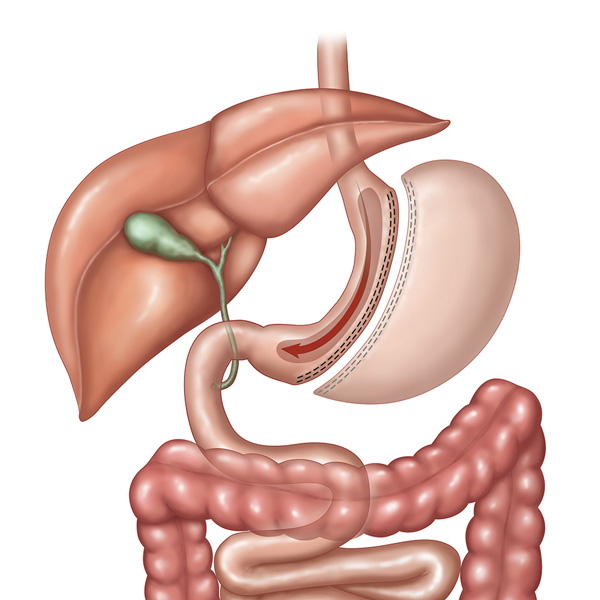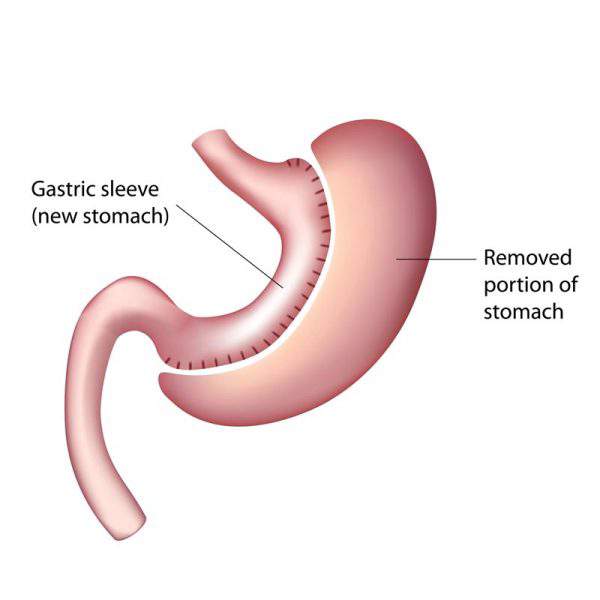Stomach Sleeve Surgery
Stomach sleeve surgery in Mashhad is a surgery on the stomach to lose weight. As your stomach gets smaller, it reduces the amount of food you eat.
In this surgery, a large part of your stomach is removed and a new, smaller abdomen about the size of a banana is created. The size of your new stomach reduces the amount of food you eat. You can have a meal and feel full for a long time. Food is absorbed normally because your intestines do not pass through the stomach.
1. What is Stomach Sleeve Surgery?
This operation, performed by Dr. NoorShafiei, creates a small stomach using specialized devices for this operation, and the rest of your stomach is permanently removed. Your stomach size will be reduced by about 75%.
Sleeve surgery can be performed in one step. Or it could be the first step before other weight loss surgeries, such as a gastric bypass.
2. What does Stomach Sleeve Surgery Involve?
Before surgery, you will receive a general anesthesia that will put you to sleep.
Stomach sleeve surgery in Mashhad is usually performed using a small camera called a laparoscopy, which is placed in the stomach and allows Dr. Noorshafiee to see inside the stomach.
Dr. Noorshafiee makes two to five small incisions in your abdomen and transmits the laparoscope and other instruments needed for the surgery through these holes. The large part of your stomach is removed and the remaining parts of the stomach are sewn together. This causes the stomach to form a vertical tube or banana.
This procedure takes between 60 and 90 minutes.

3. History of Stomach sleeve surgery
The operation was introduced in 1988 as a British surgery to treat harmful and ultra-harmful obesity called Biliopancreatic. This surgery had a high risk that it was performed before gastric bypass surgery.
Gastric sleeve surgery, the first step in the two-step method of treating obesity, showed very good results and led to an independent procedure. As a result, since 2003, Mashhad gastric sleeve surgery has been offered as a separate surgical procedure.
In 2012, the ASMBS Association for Metabolism and Tissue Surgery issued a statement about the surgery as a new surgical procedure.
This is recommended if your BMI is 40 or higher or if you are at least 45 kg overweight. It may also be recommended if you have a BMI of 35 or higher, as well as a serious medical condition that may improve with weight loss. Some of these conditions include sleep apnea, type 2 diabetes and heart disease. Mashhad gastric sleeve surgery may also be recommended for the treatment of people who are very obese or have a BMI of 60 or higher.
Dr. Noor Shafiee will talk to you about this surgical procedure, and if you are qualified for this type of surgery to lose weight, surgery will be performed.

4. Is Stomach Sleeve Surgery a good option for me?
If you prefer weight loss for weight loss surgery, which leads to weight loss by limiting the amount of food you eat and does not interfere with food absorption, then gastric sleeve surgery can be the best option for you.
You need to keep in mind that weight loss is usually slow and you need to exercise and diet to lose weight. It is not possible to return the stomach to its previous state after gastric sleeve surgery.
Your BMI may indicate that you should not have another surgery first, in which case Dr. Norshafiee may suggest gastric sleeve surgery to lose extra weight so that you lose more weight after the second operation. give.
It is best to talk to Dr. Noor Shafiee about weight loss surgery options and the most appropriate surgical procedure.
5. Am I Eligible?
Usually in weight loss surgery like gastric sleeve surgery you can’t lose a lot of weight and maintain your weight in the long run with diet and exercise.
6. Benefits of gastric sleeve surgery in Mashhad
Stomach sleeve surgery in Mashhad will significantly reduce your calorie intake. You can eat normally but with smaller meals. This can lead to significant weight loss in a relatively short period of time. In clinical trials, patients lost an average of 66% of their excess weight.
As this surgery preserves the pylorus (a valve that regulates gastric emptying). It allows food to stay in the stomach, which makes you feel fuller.
This surgery does not affect food absorption, so nutritional deficiencies may occur less frequently.
A portion of your stomach that contains hormone-induced cells called ghrelin is removed during surgery, so hunger is less likely to be felt.
Postoperative weight loss can also improve many of your medical conditions. Conditions that may improve include asthma, type 2 diabetes, heart disease, high blood pressure, sleep apnea, high cholesterol, and gastrointestinal illness.

7. What are the risks of Stomach sleeve surgery?
As with any weight loss surgery, there are potential risks and it is important to know them before surgery. Most patients have no complications after surgery, but complications can occur and depend on your health status.
Special potential postoperative complications:
Leakage of digestive contents from the main line that can lead to serious infection.
Injuries to nearby organs such as the stomach and intestines during surgery.
Gastritis (inflammation of the gastric fluid), heartburn, or stomach ulcers.
A sore inside your stomach that could lead to a blockage in your gut in the future.
Vomiting due to overeating.
8. Preparing for Stomach sleeve surgery in Mashhad
When preparing for weight loss surgery, you should be able to make lifelong commitments to major changes in your diet and lifestyle.
Always tell your surgeon what medications, vitamins, herbs, and other supplements you are taking.
Try to start a healthy lifestyle in the weeks before your operation.
Drink soup and puree after drinking.
Make sure all the medications you need after surgery are available.

9. After Surgery
You will be discharged from the hospital 2 or 3 days after the operation. You should drink fluids after surgery. You should have a special diet under the supervision of a nutritionist. Finally, meals should be small. Your small stomach sac fills up quickly, and after eating a very small amount of food, you should feel full.
When you are discharged, you will be given painkillers if you are diagnosed by a doctor. For the first few days after surgery, you should rest and do very little activity, as well as make sure you have someone at home to help you.


